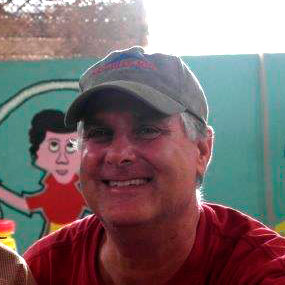- ON THE DECADE
- THE DECADE'S CAMPAIGN
- REPORTING ON PROGRESS
- THE DECADE'S PROGRAMMES
- FOCUS AREAS
-
- Access to sanitation
- Financing water
- Gender and water
- Human right to water
- Integrated Water Resources Management
- Transboundary waters
- Water and cities
- Water and energy
- Water and food security
- Water and sustainable development
- Water and the green economy
- Water cooperation
- Water quality
- Water scarcity
- FOCUS REGIONS
- RESOURCES FOR
- UN e-RESOURCES
Water for Life Voices
Voices from Civil Society Organisations
Mark Hreljac
Project Manager, Ryan’s Well

"From our perspective, as a small organization, there’s been more of a coming together of those doing similar work [over the Decade]. And there’s momentum now in sustainability and capacity building. It was there before, but more are now buying in. At ground level there are less fly-by-nights. We’ve always stayed in the places where we’ve built wells consistently. While, in the places we go to, 5, 6, 7 years ago there were drilling companies that came in, got paid and left, put in no input. Over the last few years that is gone, we’ve seen less of that.
There’s been some great sharing of information, for example the Rural Water Sanitation Network’s (RWSN) online discussions. We’ve really benefited from those who shared their expertise with us, such as Sean Furey of RWSN.
Our great strength is our partners on the ground who live in the communities; they’re there for the long haul. Everyone’s talking about more monitoring now, but we’re not finding that to be hugely important. We find if we put a lot of time in at front end, with training and engagement, it’s not needed. We have some failures of course, everyone does. Maybe big organizations struggle more than we do because they’re talking in terms of bigger sums of money.
We try to make everything holistic, everything with WASH. We’ve never been about quick fix, scaling up, choosing the easy areas over the tougher ones. Maybe that’s the strength of a small organization like ours. We can go in and apply a solution that’s uniquely geared to the community it involves. We’ve learned a lot from those on the ground who are actually doing things. We’ve found people have been hugely generous with their knowledge and experience. We’ve been lucky to catch on with good people. We concentrate on specific areas because of our limited budget. Our objective is always that no other organization has to follow us in, because we’ve done a good job in the first place and left a sustainable set up.
Today we’re building on the momentum we’ve developed. We’re working more with municipal governments, helping communities to put pressure on them to fulfill obligations. We have to work more with these local governments to put pressure on them to get involved from the beginning, and take responsibility for their communities.
We’re looking to engage in more WASH training. We have great partners on the ground with handwashing stations, but there’s a long way to go with training for even basic soap use.
Feedback from the likes of Water Aid has been invaluable. It’s refreshing the sharing of opinions about what’s being done. All that discussion has benefitted us immensely.
We’ve got 7 or 8 great partners on the ground, but sometimes it’s hard to build capacity with them because we’re so small. We’d like to partner other organizations, reach out to them to help build the capacity for those on the ground by sharing capital costs. That’s hopefully what we’ll see in the future."
>> Intro
>> Progress
>> Pride
>> Hope
>> Your Voice
>> End
>> Full Exhibition
>> Ecosystems
>> Empowering communities
>> Food security
>> Gender and water
>> Groundwater
>> Hygiene
>> Open defecation
>> Participation
>> Sustainable development
>> Water and culture
>> Water and disasters
>> Water and energy
>> Water and health
>> Water for cities
>> Water efficiency
>> Water quality
>> Water scarcity
>> Voices of experts
>> Voices from business
>> Voices from the civil society
>> Voices from the field: case studies
>> Africa
>> Asia and the Pacific
>> Europe
>> Latin America and the Caribbean
>> Middle East
>> Oceania
>> Decade’s achievements. From MDGs to SDGs
>> Five years of UN-Water "Water for Life"
Awards 2011-2015
>> Water for Life Voices
Copyright | Terms of use | Privacy notice | Site Index | Fraud alert | Help




